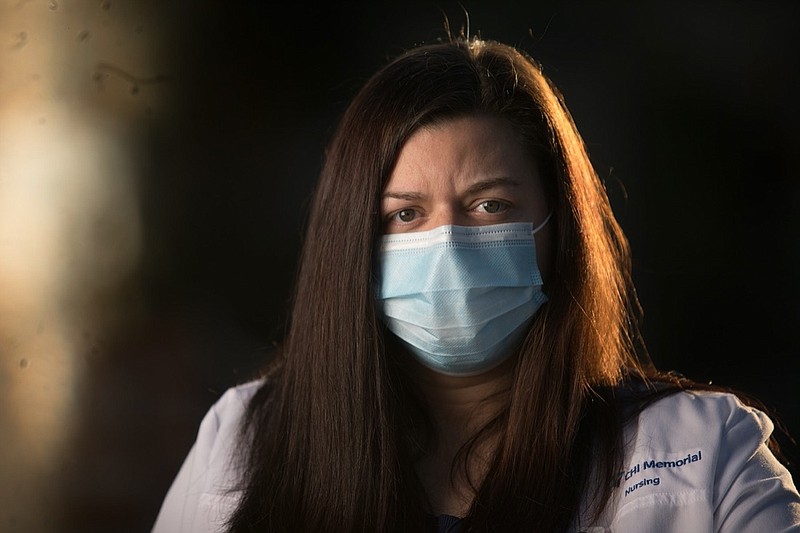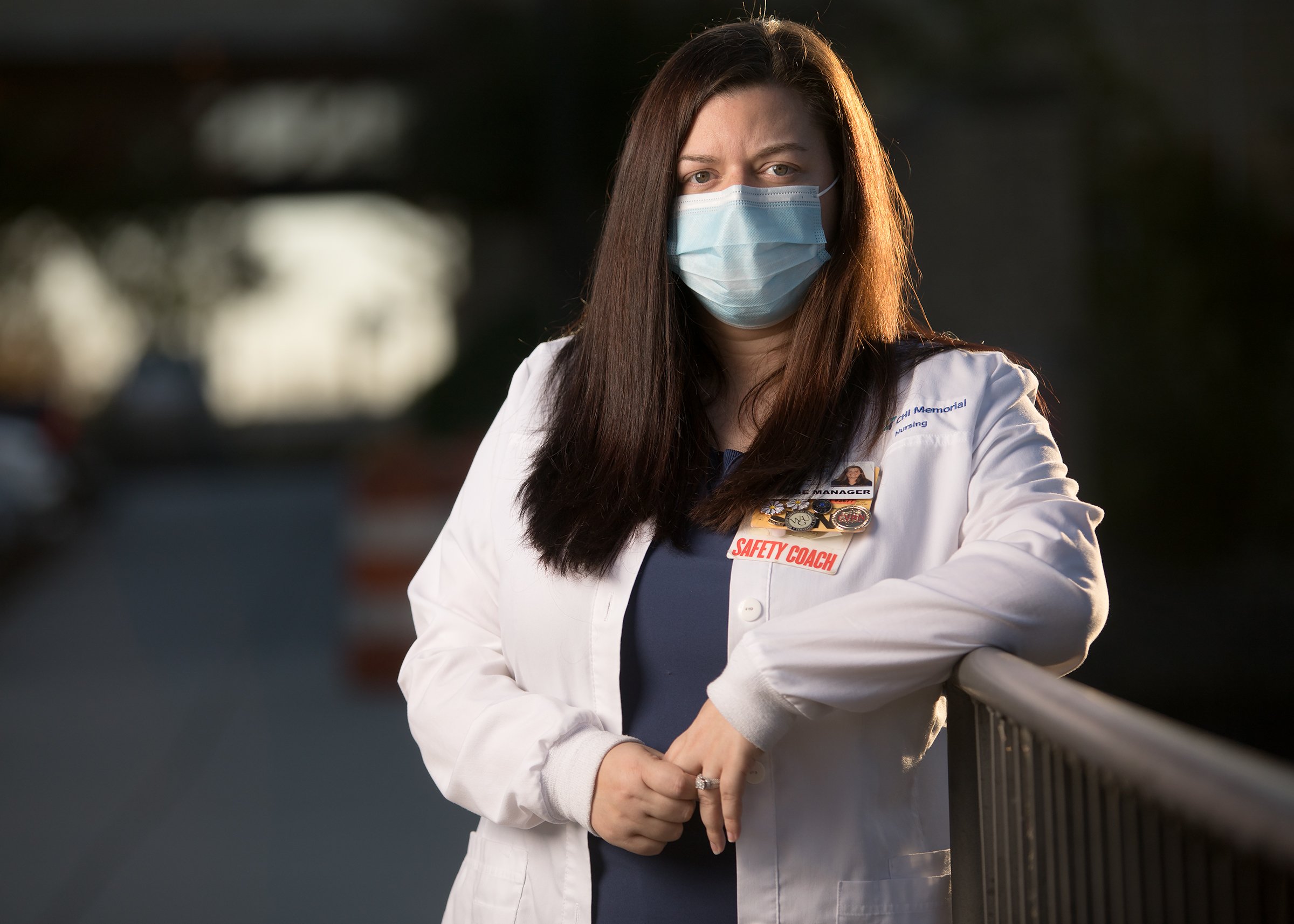 Staff photo by Troy Stolt / Mandee Bowman, a nurse manager in one of CHI Memorial's COVID-19 units, is photographed at the end of her shift on Friday, Nov. 20, 2020, in Chattanooga, Tenn. "As a care giver, every day you go in and you give everything you have to your patients for 12 hours, and you leave everything you are with your patients," Bowman said of her experience treating patients. "We've seen all ages in all phases of illness, we've seen older people who weren't that bad, and very young people lose their lives."
Staff photo by Troy Stolt / Mandee Bowman, a nurse manager in one of CHI Memorial's COVID-19 units, is photographed at the end of her shift on Friday, Nov. 20, 2020, in Chattanooga, Tenn. "As a care giver, every day you go in and you give everything you have to your patients for 12 hours, and you leave everything you are with your patients," Bowman said of her experience treating patients. "We've seen all ages in all phases of illness, we've seen older people who weren't that bad, and very young people lose their lives."As the coronavirus pandemic in the Chattanooga region continues to shatter previous records, it is taking a particular toll on the nurses who have been working around the clock to treat patients since March. Here's what some of them had to say after their shifts this week and what they want people to know heading into the Thanksgiving holiday.
Mandee Bowman, a nurse manager in one of CHI Memorial's COVID-19 units, said the influx in COVID-19 patients over the last two weeks is significant. She thinks if more people understood the degree of suffering that comes with this disease, they might be more willing to wear face masks and not gather with groups of people.
"This is an absolutely terrible virus. It impacts every age, every race, every religion. It shows no mercy," Bowman said. "It is emotionally exhausting as a health care provider, because not only are we dealing with the illness in front of us, we're dealing with the fear and the uncertainty and the separation from loved ones."
Even though people may want to see family and friends, Bowman said it's crucial that they follow the safety guidelines.
"If we want to have a next Thanksgiving and a next Christmas and a next birthday, we have to do the right thing and be the person that sets that example in the community. If you love your loved ones and you want to have more time with them, protect them," she said. "We're here to hold a hand. We're here to give the medical care, but we would love to have less people that needed that care."
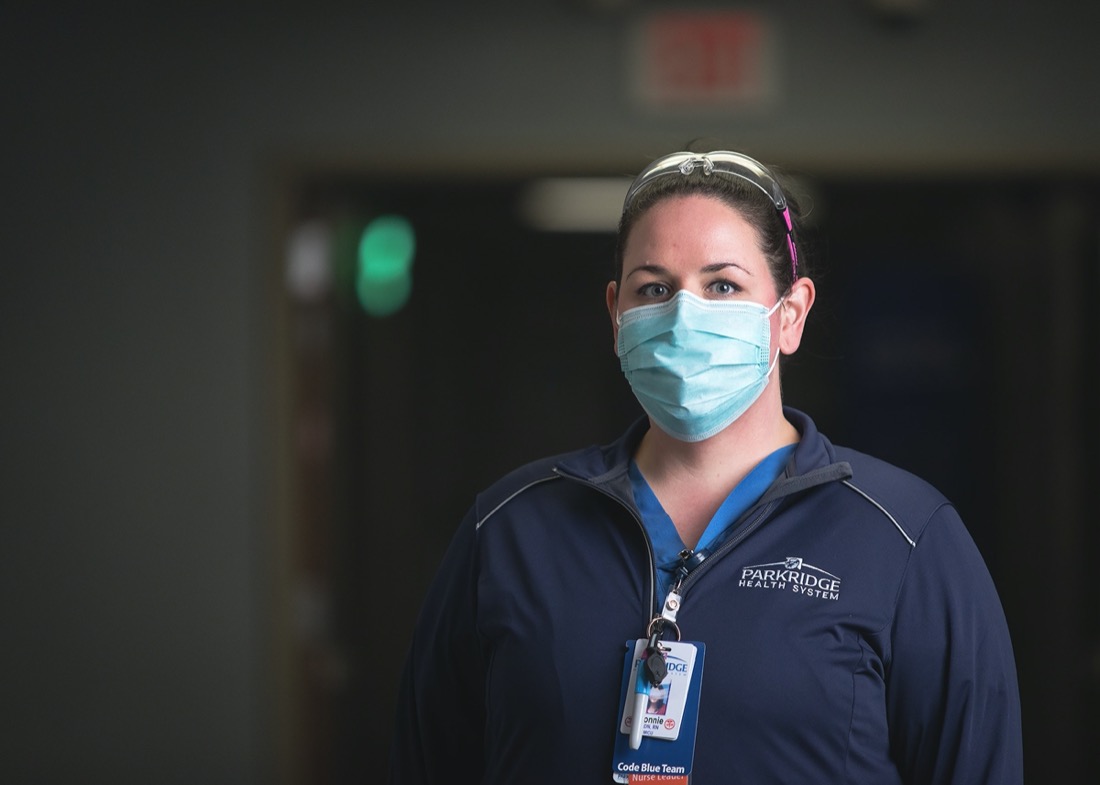 Staff photo by Troy Stolt / Bonnie Phillips, a critical care nurse in the medical intensive care unit at Parkridge, is photographed after her shift on Wednesday, Nov. 18, 2020, in Chattanooga, Tenn.
"Last week, we saw our youngest patient yet die of COVID. She was 22," Phillips said. "It's just very physically and emotionally hard to care for these patients. A lot of them are with us for a long time. We basically try to be their family."
Staff photo by Troy Stolt / Bonnie Phillips, a critical care nurse in the medical intensive care unit at Parkridge, is photographed after her shift on Wednesday, Nov. 18, 2020, in Chattanooga, Tenn.
"Last week, we saw our youngest patient yet die of COVID. She was 22," Phillips said. "It's just very physically and emotionally hard to care for these patients. A lot of them are with us for a long time. We basically try to be their family."Bonnie Phillips, a critical care nurse in the medical intensive care unit at Parkridge, said that last week she lost her youngest COVID-19 patient yet. The patient was 22 years old.
Since families can't be with patients when they die, Phillips said, the nurses try to fill that void. And because coronavirus patients are so sick, they're often in the hospital for over a month, she said.
"Watching them decline after we've gotten to know them and gotten to know their family and gotten close to them, it's very difficult," Phillips said, adding that it's important to know that the disease doesn't just affect older people. "It's all over the age spectrum."
She's especially nervous about the weeks after Thanksgiving.
"We're already seeing a surge with people not taking it as serious," she said. "So with all the holidays, I'm afraid about where we're going to put all these people."
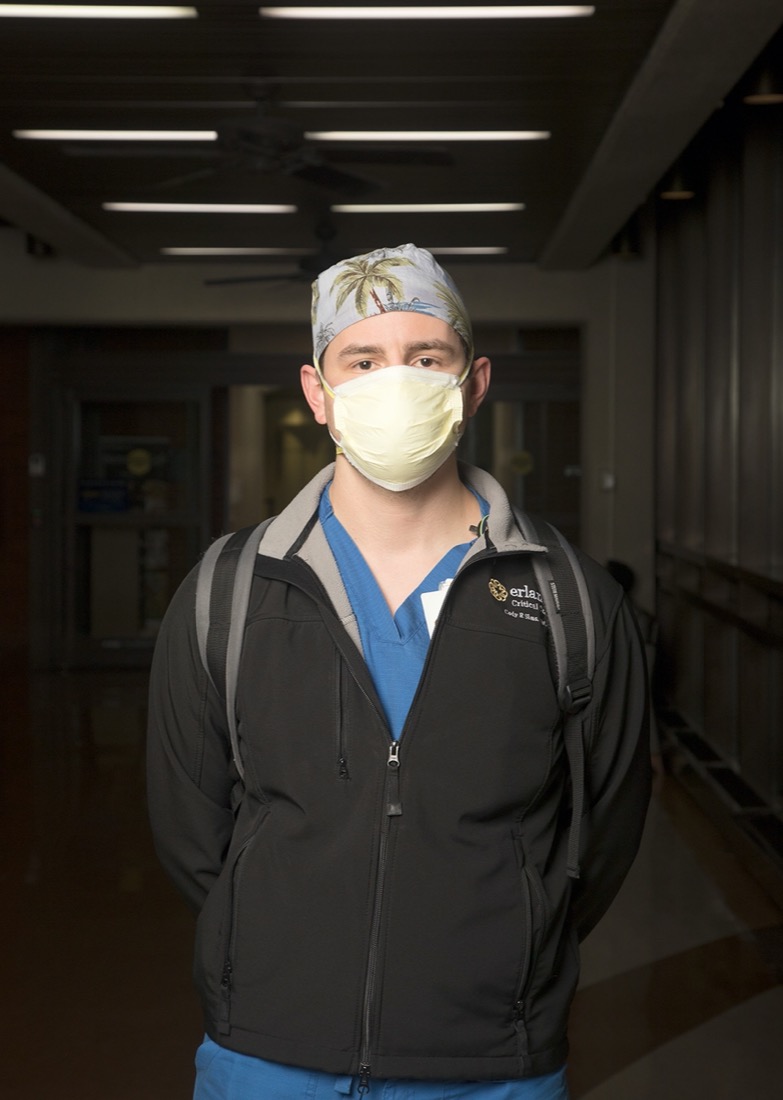 Staff photo by Troy Stolt / Cody Sims, a critical care nurse and team lead in the medical intensive care unit at Erlanger, is photographed at the end of his shift on Thursday, Nov. 19, 2020, in Chattanooga, Tenn. "It's been very difficult for us," Sims said. "We spend a lot of time with our patients — we get to know them, we learn their stories, we laugh with them, cry with them. It's a lot of investment, even when things do go well. And when things don't, it takes a toll."
Staff photo by Troy Stolt / Cody Sims, a critical care nurse and team lead in the medical intensive care unit at Erlanger, is photographed at the end of his shift on Thursday, Nov. 19, 2020, in Chattanooga, Tenn. "It's been very difficult for us," Sims said. "We spend a lot of time with our patients — we get to know them, we learn their stories, we laugh with them, cry with them. It's a lot of investment, even when things do go well. And when things don't, it takes a toll."Cody Sims, a critical care nurse and team lead in the medical intensive care unit at Erlanger Hospital, said caring for COVID-19 patients requires a lot of time and commitment. Even though his team is one of the strongest in the hospital, keeping this pace is taking its toll.
"It's very overwhelming when you are investing all of this time to be the patient's family, because their's can't be there," Sims said. "We spend a lot of time with our patients - we get to know them, we learn their stories, we laugh with them, cry with them. It's a lot of investment, even when things do go well. And when things don't, it takes a toll."
(READ MORE: Chattanooga area hospitals warned of looming COVID-19 crisis)
The latest surge has forced them to change plans so they can accommodate the growing number of patients. He wants anyone who can stay home and avoid spending time with others to please do so.
"It's too important right now to try and bend the curve," Sims said. "I understand people haven't seen their families, and this is a very big time for family. But at the same time, we've never had a virus, a pandemic like this before."
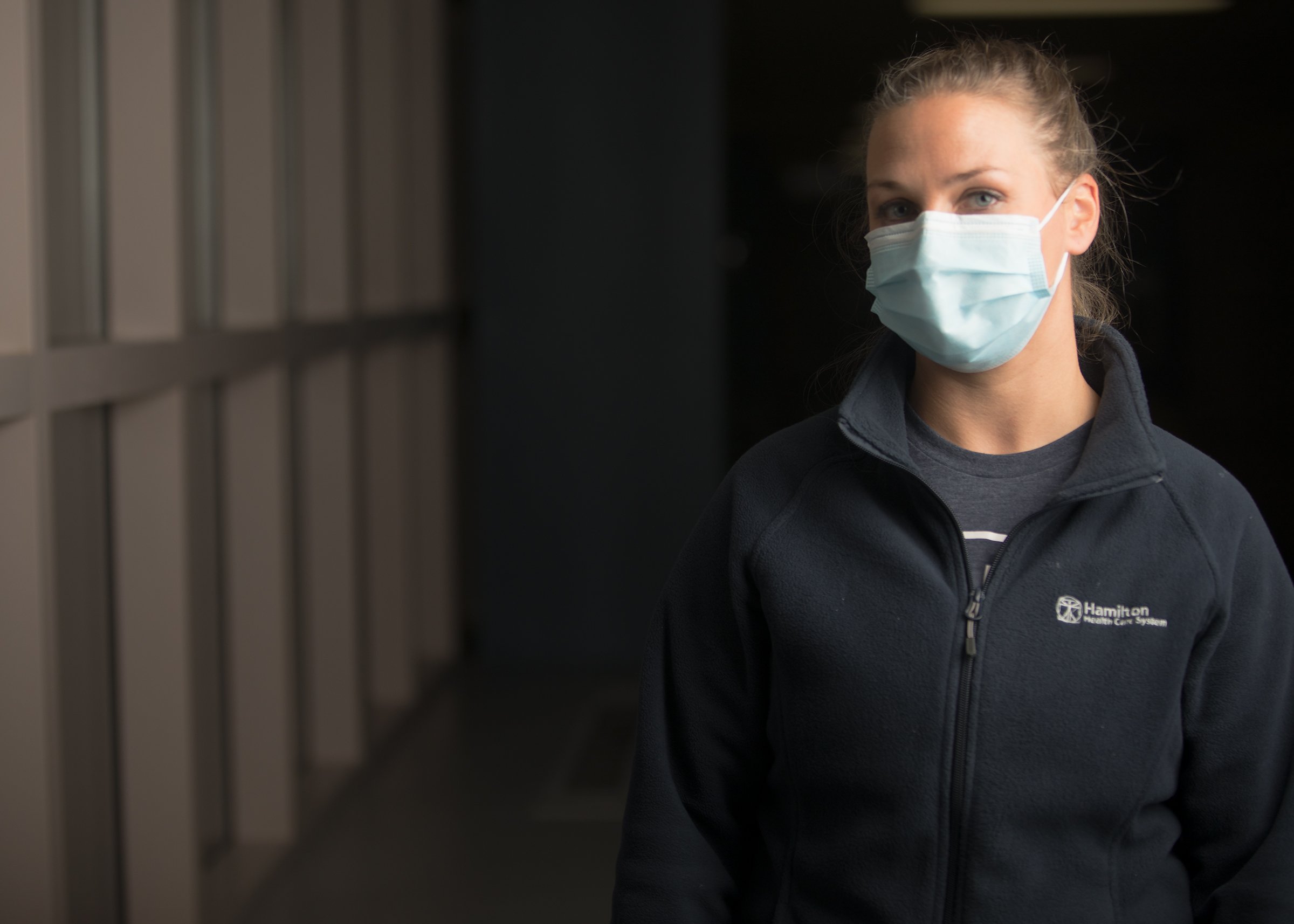 Staff photo by Troy Stolt / Brea Johnson, a registered nurse in the medical intensive care unit at Hamilton Medical Center, is photographed at the end of her shift on Friday, Nov. 20, 2020, in Dalton, Georgia. "When we go home, because we've seen so many poor outcomes, the first thing we think of as a nurse is what could we have done differently," Johnson said of treating COVID-19 patients in Whitfield County. "Right now, we just don't know."
Staff photo by Troy Stolt / Brea Johnson, a registered nurse in the medical intensive care unit at Hamilton Medical Center, is photographed at the end of her shift on Friday, Nov. 20, 2020, in Dalton, Georgia. "When we go home, because we've seen so many poor outcomes, the first thing we think of as a nurse is what could we have done differently," Johnson said of treating COVID-19 patients in Whitfield County. "Right now, we just don't know."Brea Johnson, a registered nurse in the medical intensive care unit at Hamilton Medical Center, said every day caring for COVID-19 patients is a battle.
"Unless you're in it, you just don't understand it," she said. "It's ingrained in a nurse to wonder what could you have done differently, and right now, we just don't know. It's constantly feeling defeated."
She hopes everyone limits the number of people they're around until the pandemic improves and stays mindful that they can be asymptomatic and unknowingly spread the disease.
"I think that every nurse that I work with, at least once daily we picture either ourselves or that being our family member that's in the bed," Johnson said. "Especially around this time of year. We're very thankful that those of us that have well family members, that we do have that, because we think about that constantly."
Staff photographer Troy Stolt contributed reporting to this story.
Contact Elizabeth Fite at efite@timesfreepress.com or follow her on Twitter @ecfite.
